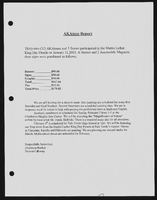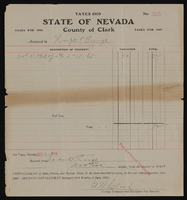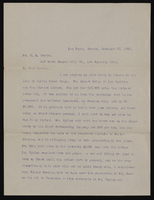Search the Special Collections and Archives Portal
Search Results
Ronnow Family Photographs
Identifier
Abstract
The Ronnow Family Photographs contain four black-and-white photographic prints of the Ronnow family in Southern Nevada from approximately 1870 to 1950. Also included is one large oversized black-and-white photographic print of the Old Rotary Club with C. C. Ronnow present.
Archival Collection
Nevada Consolidated Copper Company Records
Identifier
Abstract
The Nevada Consolidated Copper Company Records (approximately 1907-1978) contain the business records of the company, including correspondence, freight bills, ledgers, maps, leaching data, and books relating to mining. The majority of the records post-date the company's name change to Kennecott Mining Company.
Archival Collection
UNLV University Libraries Collection on Goldfield, Nevada
Identifier
Abstract
The UNLV University Libraries Collection on Goldfield, Nevada Collection dates from 1906 to 2009, with the bulk dating from 1906 to 1917 and documents the mining, business, and civic history of Goldfield, Nevada. Items in the collection include a program from the Nelson-Gans boxing match, a letter from H. M. Yerington describing the miners' strike, mine prospectuses, and minutes from the Goldfield Woman's Club.
Archival Collection
Nevada-Utah Mines and Smelters Corporation Records
Identifier
Abstract
The Nevada-Utah Mines and Smelters Corporation Records (1889-1949) are comprised of the financial records of the company's activity regarding the Manhattan mine in Pioche, Lincoln County, Nevada. The collection contains bank records, accounts, and some correspondence, and is generally related to the company's financial activities. It also includes the company's financial vouchers, bills, receipts, and checks.
Archival Collection
J. Ross Clark Scrapbook
Identifier
Abstract
The J. Ross Clark Scrapbook dates from approximately 1897 to 1972 and consists of newspaper clippings collected by his wife, Miriam Evans Clark. The clippings relate to professional events in the lives of J. Ross Clark and his brother, Senator William A. Clark. A small number of the clippings refer to births, marriages, and deaths in Miriam Evans and J. Ross Clark's families. Also included are documents written by J. Ross Clark's grand-niece, Dorothy Murdock Dunkley, that offer additional information about the Clark and associated families.
Archival Collection
Elizabeth Harrington Collection of Essays
Identifier
Abstract
This collection contains the original drafts of the thirteen essays that Elizabeth Harrington wrote about her life in early Las Vegas, Nevada. These articles were written from her memory and experiences of life in Las Vegas beginning in the early 1900s, and were published in the Nevadan section of the Las Vegas Review-Journal from 1975-1979.
Archival Collection
Artemus W. Ham Family Papers
Identifier
Abstract
The Artemus W. Ham Family Papers (1857-1970) contain postcards written by family members, newspaper clippings about the Ham family, and a Nevada Senate Concurrent Resolution memorializing Artemus W. Ham, Sr. Also included are genealogy notes, a commencement program from Michigan Law School, and membership cards of Artemus W. Ham, Sr.
Archival Collection

Alpha Kappa Alpha Sorority, Theta Theta Omega Chapter AKAteens reports
Date
Archival Collection
Description
From the Alpha Kappa Alpha Sorority, Incorporated, Theta Theta Omega Chapter Records (MS-01014) -- Chapter records file.
Text

Tax bills and receipts: Sadie George
Date
Archival Collection
Description
Text

Correspondence, F.R. McNamee to H.E. George
Date
Archival Collection
Description
Text
